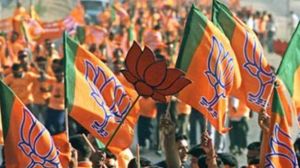Tackle corruption, make money talk
Once possessing wealth disproportionate to known sources of income is made a liability, the majority will begin to toe the line

Many have disliked the comment of a Supreme Court judge observing that 8220;everyone wants to loot this country. The only deterrent is to hang a few corrupt persons from the lamp-post.8221; But it certainly reflects the frustration and deep anguish over the rise of such egregious behaviour within the existing structures of governance. The fact is that the system is ridden with corruption and that the phenomenon is increasing at an alarming pace. What8217;s more, past experience indicates that all the systems set up to check the malaise 8212; the CVC, Lok Ayuktas, the CBI, the vigilance machinery in various states, and so on 8212; have not produced the desired results. Even a major initiative like the Right to Information Act, it seems, is not going to check corruption in this country.
As per the law, it is the duty of every public servant, whether a political executive or a bureaucrat, to not only remain honest but to ensure that everyone working under him works with utmost integrity section 31 i and 32 i of the civil services conduct rules. If the above rule is seen in its totality, then only those occupying the highest positions in the system are responsible for the present state of affairs, and unless they are made to pay for their corrupt practices or non-performance, things will not change. Since it is impossible to find a person who keeps taking illegal decisions or doing the wrong thing without earning illegal money, it may be possible to zero in on him or her. We need to identify such persons and root them out of the system.
Now the question is, why does the problem of corruption seem so difficult to tackle? Those who are familiar with the system know that truth speaks and speaks loudly. Every piece of paper tells the truth but those who are at the helm of affairs, in most cases, have no intention of getting to the truth. The ultimate truth is not who has done what kind of wrong or which decision in which file caused how much loss to the public exchequer or which policy, though promulgated in the name of public, caused how much loss to public interest, but that many of those who have been, or are at present at the helm of affairs, have hundreds and thousands of crores of rupees of unaccounted wealth.
It would be an inordinate waste of time to go through piles of papers and debate on whether a particular decision had the concurrence of X or Y, or who wrote what in the file or whether norms were followed or not. Why not just ask a simple question of all those who are occupying, or occupied in the past, those top positions both political and bureaucratic to account for every penny that they possess today. Wealth speaks 8212; no one can silence it. It talks, it walks. One can hide files or misplace them or burn them, but property created or wealth accumulated, cannot be hidden. Everyone in the town, state and the country, except those who ought to know, understands who owns what, legally or illegally. So the simplest way to attack and eliminate corruption is to attack the ill-gotten wealth of all those who were or are in positions and power. Compulsory verification of the assets of the top functionaries of past and present is the key to solving the problem. It should be a very simple solution indeed.
Who will do this? That is the million dollar question. Obviously, it is the job of the government of the day. If people at the top are honest they will welcome it, because it would be about throwing corruption out of the system. But the reality is different, and it is unlikely to happen easily. Public opinion has to be built for this demand by articulating the demand first and then propagating the idea. A series of activities can be generated around this demand. Looking at the prevailing public mood, it can help create a mass movement against corruption, which will pave the way for compulsory verification of the assets of all those who are occupying, or had occupied, top positions in the system. To begin with, the assets/properties of a select few have to be taken up for investigation.
Once possessing wealth disproportionate to known sources of income is made a liability, the majority will start to toe the line. Many countries the world over have solved this problem. So why can8217;t India?
The writer is a senior IAS officer
- 01
- 02
- 03
- 04
- 05































